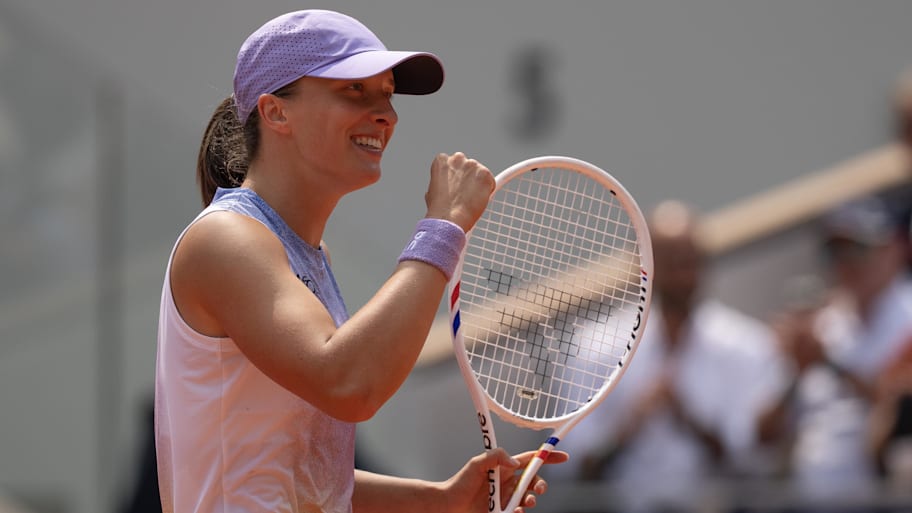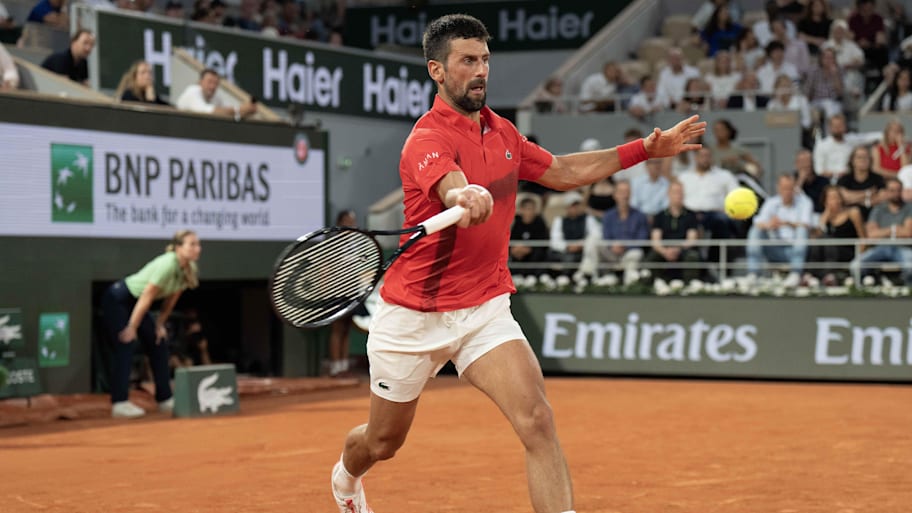As it is written, Wednesday is mailbag day …
- Here’s the Served re-draw show and the Andre Agassi interview.
- Chris Evert and Martina Navratilova met at a major for the first time 50 years ago.
- We’ll do our 50 Thoughts wrap column from Roland Garros after the men’s final on Sunday. But here’s some Q&A …
I don’t know how much people paid for their night session tickets, but I certainly would have felt [cheated] to have paid for a less-than-fascinating match between [Jannik] Sinner & [Andrey] Rublev. Meanwhile, there were [four] competitive women’s matches played during the day including the surprise upset of [Jessica] Pegula by a French woman, [Loïs] Boisson. That would have been a great night match.
Is there a reason not to schedule two women’s matches for a night session? I get that there is a risk of a late night if the day session runs long and both women’s matches are three sets. But, it seems [tournament director Amélie] Mauresmo et al are simply afraid to take a chance that the French crowd might be displeased.
Barbara
Lexington, MA
• I was going to write more about this at the end of the event, but we had so many questions this week about the absence of women … some quick thoughts:
1) For all the injustices and inequalities in tennis, I’m not sure the imbalance of women playing night matches—in a strange, sometimes charm-deprived, often rhythm-disrupting session—tops the list. But you can’t have night sessions that feature only men, as was the case this year. And Ons Jabeur raised the best point: The lack of exposure is not just an insult; it is self-perpetuating. Tell fans that women’s tennis is (literally) unworthy of prime time at a major, and is it a surprise that women’s matches throughout the year are not as prioritized (or attended or televised) throughout the year? The message this scheduling sends is corrosive. The message this scheduling sends is untenable.
2) Yes, women’s matches tend to be shorter than men’s. Yes, you run the risk of a 57-minute blowout that might make ticket holders feel shortchanged. And there’s a really easy solution. Hold two women’s matches. Or hold a women’s match followed by a doubles match.
3) What’s that? Amazon, the television network for the night session, demands only men’s night session matches? Tell them, you are a television partner and partners help each other out and operate as a good faith relationship. This has created a PR crisis that needs addressing, even if that means amending a contract.
4) As I write this, Alexander Zverev just won his fourth round match in 52 minutes, with his opponent, Tallon Griekspoor, retiring with an injury. It is midafternoon, but this could easily have been a night match. Are you not tempting fate by staging only one match, men’s or women’s?
5) Mauresmo—known as something of a progressive blazer of trails in her playing days—either believes the men’s only night matches is acceptable policy, or she has been trotted out as the front-facing figure to take the slings and arrows. In either case, this is a profound pity.
6) For all the challenges that bedevil tennis, this one seems exceedingly solvable. Put on additional matches, including doubles. In a worst-case scenario, put on women’s matches and hope you get Boisson-Pegula, not a match ending in less than an hour. But this is the only major that faces this annual controversy. It must change.
Novak Djokovic’s path to the second week at RG:
R1: McDonald (98)
R2: Moutet (73)
R3: Misolic (153)
R4: Norrie (81)
Watch this space. Could be an exciting storyline.
Best, Christopher Carroll
• I agree it could be exciting. No doubt the draw fates smiled on him in Week 1. In Week 2? As I write this he conceivably could have to go through Zverev (his next opponent), Sinner and Carlos Alcaraz to win. Again, you can only beat the players placed before you.
We know that players rent homes at Wimbledon and stay near the court in the village. I’m curious where players stay during the French Open?
Peter T., NYC
• First, I’m curious to hear from you how the French Open vs. Roland Garros bit is going? To digress further … imagine pulling Roland Garros, World War I pilot, aside more than 100 years ago and saying, Check this out, in 100 years your name will figure prominently in a branding exercise for a tennis tournament. One that pays the winner 2.55 million euros. What’s a euro? Never mind.
Anyway, I know of one player who has an Airbnb. But most of the players stay at hotels in the 8th arrondissement, which, depending on traffic, is 15 minutes or so from the site. (Even less on an e-bike!)
Hi Jon,
How would you compare the level of camaraderie on the WTA tour with that on the men’s side?
I ask because to me, it seems that the net meetings at the end of the matches look very different, the men’s and the women’s. The men frequently embrace warmly, exchange a few words, many times more than a few, smile, pat each other on the shoulder/belly/chest, and all that. On the women’s side, however, whilst there is the occasional double cheek peck to be seen, more often than not it’s just the briefest of handshakes, then they turn away from each other and walk off.
There is, of course, the occasional contentious match on the men’s side which doesn’t end so warmly, but by and large they seem a very convivial bunch, full of bonhomie in a way that seems to be missing from the ladies side. Am I wrong?
Gavin
• There’s a gender studies dissertation in here somewhere. All sorts of socialization and mores and culture. My take is that it’s very case-by-case. Yes, there are some WTA handshakes that come with a layer of permafrost. But then you see Daria Kasatkina and Mirra Andreeva joking with each other or Madison Keys hugging most opponents. Or Keys and Taylor Townsend.
And, yes, you have these bromances in men’s tennis. We talked recently about Sinner-Alcaraz following the Roger Federer–Rafael Nadal rivals-need-not-be-enemies model. But you also have Arthur Fils–Jaume Munar or Ben Shelton–Andrea Vavassori or matches requiring the chair umpire to double as a bouncer and break up a fight.
Note I am trying to avoid a gendered conversation. But here’s my take: For most players this is partially about likes and dislikes and friendships. But it is also a matter of optimizing performance. Friction and aggro is fun for fans. But for most players, the less distraction and tension and build-up, the better for their game.

Hi Jon,
I have been a fan of Iga [Świątek]’s for many years now. But, in the Round of 16, [third] set at 4–4, [Elena] Rybakina double faults on a second serve for Świątek to go up 5–4. But wait! The chair umpire comes down to check the ball mark and the ball actually caught the service line! Umpire says the ball was good. Iga says “I didn’t ask you to check the mark.” Wow. Really bad sportsmanship right there! I think Lindsay Davenport even said that it’s the chair’s job to make sure the calls are accurate (and not only if a player asks for a check). Rybakina went on to hold to go up 5–4. It was a great match up to that point and I was enjoying seeing Iga fight and come back, but it was hard to root for Świątek from that point forward. I know there have been other complaints about Iga’s sportsmanship. What are your thoughts here?
Tim in Atlanta
• It was indeed a strange interval. Rybakina “double-faulted” and walked to the chair dejectedly, without issuing a protest. Świątek was, understandably, less than pleased that chair umpire Kader Nouni took it upon himself to examine the mark. When he ruled the serve “in,” Świątek didn’t protest much.
A) My read: Perversely, the server thought the serve was out. The returner thought the serve was good.
B) Good for Nouni for having the courage—on such a critical point—to come down, unsolicited.
C) Good for him as well for getting it right. It would have been disastrous if replay had contradicted his judgment. It did not.
D) This will not happen next year when robots replace people at the final major.
E) Not only was Rybakina spared a double fault but she got a first serve.
F) Świątek won the match so any controversy was minimal.
G) I didn’t think Świątek did anything unsporting. At a critical point of a critical match, she expressed frustration. Then she went about her business. Cut her some slack, I say.
Hi Jon,
Long time tennis fan—a big fan of your mailbag as well!
So … how about we start a movement to have Americans move away from pronouncing Roland Gow-ros to the correct Roland Gah-ros? Surely it can't be too difficult?
We don't have to worry anymore about SheraPOva to ShaRApova lolz
A librarian who cringes at our pronunciations,
Ani
• Thanks. Both as a matter of professionalism and respect we should strive to make correct pronunciation. But at what point do we make concessions? If we do Gah-Ros, must we say Pair-ee as well? Jasmine Paolini won last month’s event in Roma? Kraków becomes Krak-UFF. And of course there’s the whole Bar-THEL-ona thing …
A reminder that for the players, there’s the audio icon in their ATP and WTA bios.
ENJOY THESE LAST FEW DAYS of the French Open, EVERYONE!
More French Open on Sports Illustrated
This article was originally published on www.si.com as Tennis Mailbag: Night Sessions, Novak Djokovic’s Run and More From Roland Garros.
